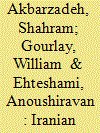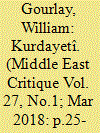|
|
|
Sort Order |
|
|
|
Items / Page
|
|
|
|
|
|
|
| Srl | Item |
| 1 |
ID:
175046


|
|
|
|
|
| Summary/Abstract |
Since the rise of the Adalet ve Kalkınma Partisi (AKP), Islam has come to play a more prominent role in public and political spheres in Turkey. This paper draws on ethnographic data gathered in Istanbul and Diyarbakir between 2013 and 2015 to highlight Kurdish attitudes to Islam. Following the electoral success of the AKP amongst Kurds in the general election of 2007, Kurdish actors have sought to incorporate Islamic sensibilities into their political offering in order to appeal to Kurdish constituents. Amid the AKP’s recent authoritarian turn and instrumentalization of religion, and the rise of Islamic State of Iraq and Syria (ISIS), many Kurds have sought to redefine their relationship with Islam to clearly demarcate distinctly Kurdish religious and political spaces.
|
|
|
|
|
|
|
|
|
|
|
|
|
|
|
|
| 2 |
ID:
190778


|
|
|
|
|
| Summary/Abstract |
This article examines Iran’s ‘forward-defence’ strategy, in particular its deployment of proxy forces in the Syrian conflict. Iran’s expanded presence in regional conflicts is regarded by its adversaries as indication of hegemonic intent, while Tehran posits its regional posture as a defensive response to security threats. We argue that Iran’s ‘forward-defence’ strategy offers practical benefits, shaping strategic realities, and performative benefits, allowing Tehran to propagate a discourse of military fortitude. On balance, however, the strategy has fed suspicions of Iran’s intentions and increased hostility towards the Iranian leadership, thus is likely to be counterproductive.
|
|
|
|
|
|
|
|
|
|
|
|
|
|
|
|
| 3 |
ID:
159232


|
|
|
|
|
| Summary/Abstract |
The advance of ISIL amid the horrors of the Syrian civil war has given impetus to the forging of political solidarity among Kurds across international borders. This article examines Kurdayetî, pan-Kurdish identification, and the way in which it is shaped by ongoing crises in the Middle East. Amid chaotic events, previously divided Kurdish populations have increased cross-border interaction and co-operation. In northern Syria, Kobani became a bellwether of pan-Kurdish hopes and fears, and a rallying point, with peshmerga from Iraqi Kurdistan passing through Turkey to help relieve the ISIL siege of the city. Meanwhile, Kurdish political groups, particularly the PYD in Syria and the Kurdistan Regional Government, have made strategic gains, raising prospects, in some quarters, of Kurdish independence. Kurdish military forces also have won international recognition (and some logistical support) for the significant role they have played in fighting ISIL. This, in turn, has heightened concerns among regional states, chiefly Turkey, which is traditionally wary of political advances for the Kurds. This article incorporates ethnographic data gathered in 2014 and 2015 in Diyarbakır and Istanbul, to analyze the surge in pan-Kurdish solidarity, confidence and political assertiveness, and the implications these have for the Kurds and the states that surround them.
|
|
|
|
|
|
|
|
|
|
|
|
|
|
|
|
| 4 |
ID:
159233


|
|
|
|
|
| Summary/Abstract |
The advance of ISIL amid the horrors of the Syrian civil war has given impetus to the forging of political solidarity among Kurds across international borders. This article examines Kurdayetî, pan-Kurdish identification, and the way in which it is shaped by ongoing crises in the Middle East. Amid chaotic events, previously divided Kurdish populations have increased cross-border interaction and co-operation. In northern Syria, Kobani became a bellwether of pan-Kurdish hopes and fears, and a rallying point, with peshmerga from Iraqi Kurdistan passing through Turkey to help relieve the ISIL siege of the city. Meanwhile, Kurdish political groups, particularly the PYD in Syria and the Kurdistan Regional Government, have made strategic gains, raising prospects, in some quarters, of Kurdish independence. Kurdish military forces also have won international recognition (and some logistical support) for the significant role they have played in fighting ISIL. This, in turn, has heightened concerns among regional states, chiefly Turkey, which is traditionally wary of political advances for the Kurds. This article incorporates ethnographic data gathered in 2014 and 2015 in Diyarbakır and Istanbul, to analyze the surge in pan-Kurdish solidarity, confidence and political assertiveness, and the implications these have for the Kurds and the states that surround them.
|
|
|
|
|
|
|
|
|
|
|
|
|
|
|
|
|
|
|
|
|